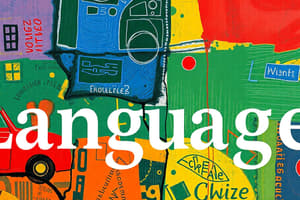Podcast
Questions and Answers
What is one of the primary purposes served by English today?
What is one of the primary purposes served by English today?
- International communication (correct)
- Enhancing cultural diversity
- Facilitating global trade
- Promoting regional languages
Which aspect of English literature is mentioned in the text?
Which aspect of English literature is mentioned in the text?
- Incorporates works from around the world (correct)
- Focuses solely on contemporary literature
- Exclusively includes works in English
- Contains only classic literature
How does learning English impact job prospects according to the text?
How does learning English impact job prospects according to the text?
- Limits job opportunities to local industries
- Has no effect on career paths
- Leads to better job prospects, especially globally (correct)
- Reduces access to knowledge beyond immediate surroundings
What role does English play in the United Nations?
What role does English play in the United Nations?
What is the relationship between English and other languages globally?
What is the relationship between English and other languages globally?
Flashcards are hidden until you start studying
Study Notes
English Language Overview
The English language is one of the most widely spoken languages on Earth, with hundreds of millions of native speakers and billions more who speak it as a second language. It originated from early Old English, which was brought to Britain by Germanic tribes around the fifth century A.D., after they invaded what is now England. From its roots in northern Europe, English has evolved over centuries into several different forms, including modern standardized varieties like British English, American English, Australian English, New Zealand English, Canadian English, South African English, Singaporean English, Philippine English, Indian English, and Malaysian English.
Origins and Development
Early forms of the language emerged among Anglo-Saxons settling in Britain during the late fifth century, where Latin was still dominant. These settlers spoke dialects related to Old Frisian, Old Saxon, and Old High German. As time progressed, these dialects diverged based on geographical location, resulting in regional variations called Middle English. During this period, French vocabulary became prominent due to Norman conquest of England, leading to many loanwords entering the language.
From there, Early Modern English developed through the Renaissance, when new words were coined from Greek and Latin roots, contributing greatly to English's rich lexicon. In the 18th century, the Industrial Revolution led to further expansion of the language, particularly in trade and colonization.
Present Usage
Today, English serves various purposes globally:
-
International communication: English serves as one of the primary means of international communication.
-
Written language: It underpins academic writing across numerous subjects, enabling scientific discovery to be shared internationally.
-
Literature: English literature includes works from around the world in addition to those written directly in the language, such as Shakespeare's sonnets.
Importance and Impact
Being one of six official languages recognized by the United Nations, English holds immense importance and power worldwide. However, this does not mean it supersedes other languages; rather, it exists alongside them to facilitate multilingualism and cultural exchange. Additionally, learning English can lead to better job prospects and career opportunities, especially within global industries. Consequently, mastery of the language allows individuals access to knowledge beyond their immediate surroundings while also preserving local identities.
Studying That Suits You
Use AI to generate personalized quizzes and flashcards to suit your learning preferences.




